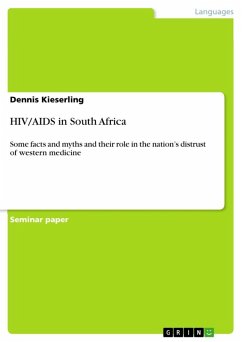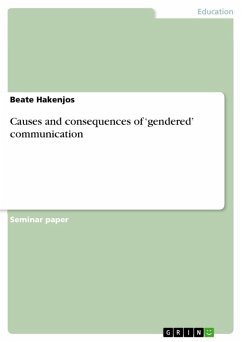
HIV/AIDS in South Africa (eBook, ePUB)
Some facts and myths and their role in the nation's distrust of western medicine
Versandkostenfrei!
Sofort per Download lieferbar
Statt: 17,95 €**
13,99 €
inkl. MwSt. und vom Verlag festgesetzt.
**Preis der gedruckten Ausgabe (Broschiertes Buch)
Alle Infos zum eBook verschenkenWeitere Ausgaben:

PAYBACK Punkte
0 °P sammeln!
Seminar paper from the year 2008 in the subject Didactics for the subject English - Applied Geography, grade: 1,0, University of Dortmund, language: English, abstract: The following paper aims at giving a condensed insight into the large body of myths and be-liefs revolving around the probably most crucial and controversial topic of the 20th and 21st century with regard to human existence on a world-wide level: the Acquired Immune Defi-ciency Syndrome (AIDS). Since the first discoveries of the virus in human beings in the late 20th century in the US as well as on the African continent, its rea...
Seminar paper from the year 2008 in the subject Didactics for the subject English - Applied Geography, grade: 1,0, University of Dortmund, language: English, abstract: The following paper aims at giving a condensed insight into the large body of myths and be-liefs revolving around the probably most crucial and controversial topic of the 20th and 21st century with regard to human existence on a world-wide level: the Acquired Immune Defi-ciency Syndrome (AIDS). Since the first discoveries of the virus in human beings in the late 20th century in the US as well as on the African continent, its real origin has not yet been determined and most impor-tantly, a cure could not be developed until today. Research has made enormous progress though and has enabled infected people to extend their life expectancy after the illness' out-break up to twenty years with the help of antiretroviral medication. But still, the disease re-mains a "killer disease," since yet incurable and thus ultimately incontrollable for human be-ings and their otherwise advanced and sophisticated medical science. The uncertainty HIV/AIDS creates with regard to its origin triggers conceivable concern and simultaneously an adamant wish to finally being able to attribute its origin and aggressive spread to a certain source. Hence, in order to give a name to what has been happening to mankind for the last decades, people clasp at straws to make the phenomenon understandable in accordance to their personal world-view. Since the unrelenting spread of the virus is to be reported from all over the world, every society and culture, depending on context, tries to make sense of the issue for itself, which means, finding reasons for HIV/AIDS that seem most probable against the background of the respective nation and its personal history. Particular explanations, when having been maintained and repeatedly used over a longer period of time, may then sometimes develop into outright myths that bear witness of a larger social and cul-tural movement of reasoning within the respective nation. Considering their foundation in a nation's history and its experience with other countries, those myths cannot be regarded as mere expressions of phantasm though but rather as cultural and social constructs that attempt to explain the world people live in. Those myths and their respective functions shall be pursued and analysed in the following essay, setting the primary focus on South Africa with its idiosyncratic set of beliefs on the one hand and the West as its perceived opponent on the other. [...]
Dieser Download kann aus rechtlichen Gründen nur mit Rechnungsadresse in A, B, BG, CY, CZ, D, DK, EW, E, FIN, F, GR, HR, H, IRL, I, LT, L, LR, M, NL, PL, P, R, S, SLO, SK ausgeliefert werden.













